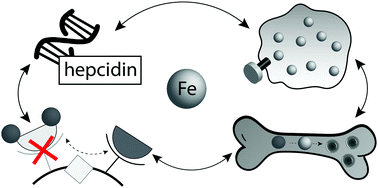Hepcidin: a real-time biomarker of iron need
Abstract
There are numerous blood-based biomarkers for assessing iron stores, but all come with certain limitations. Hepcidin is a hormone primarily produced in the liver that has been proposed as the ‘master regulator’ of dietary uptake and iron metabolism, and has enormous potential to provide a ‘real time’ indicator of body iron levels. In this Minireview, the biochemical function of hepcidin in regulating iron levels will be discussed, with a specific focus on how hepcidin can aid in the assessment of iron stores and clinical diagnosis of iron deficiency, iron deficiency anaemia and other iron-related disorders. The role hepcidin itself plays in diseases of iron metabolism will be examined, and current efforts to translate hepcidin assays into the clinic will be critically appraised. Potential limitations of hepcidin as a marker of iron need will also be addressed, as well as the development of new therapies that directly target the hormone that sits atop the hierarchy of systemic iron metabolism.

- This article is part of the themed collections: Recent Review Articles and Iron in Biology


 Please wait while we load your content...
Please wait while we load your content...